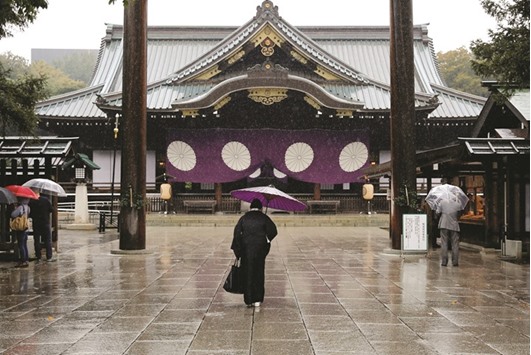Japan’s Prime Minister Shinzo Abe sent a ritual offering to a controversial war shrine yesterday, drawing fire from China which sees it as a painful reminder of Tokyo’s warring past.
The conservative premier – who has been criticised for what some see as a revisionist take on Japan’s wartime record – sent a sacred “masakaki” tree bearing his name to Yasukuni Shrine at the start of a four-day festival.
The shrine honours millions of Japanese war dead, but also senior military and political figures convicted of war crimes after World War II.
The site has for decades been a flashpoint for criticism by countries that suffered from Japan’s colonialism and aggression in the first half of the 20th century, including China and the two Koreas.
More controversial than the shrine is an accompanying museum that paints Japan as a liberator of Asia and a victim of the war.
“The Yasukuni Shrine honours class A war criminals of WWII who were directly responsible for the war,” said Chinese foreign ministry spokeswoman Hua Chunying, speaking in Beijing.
“We oppose this ritual offering and we urge Japan to reflect on its aggressive history and take concrete actions to win back the trust of its Asian neighbours and the international community.” South Korea did not immediately issue an official response.
Abe and other nationalists say Yasukuni is merely a place to remember fallen soldiers and compare it with Arlington National Cemetery in the US.
Abe visited in December 2013 to mark his first year in power, a pilgrimage that sparked fury in Beijing and Seoul and earned a diplomatic rebuke from close ally the US, which said it was “disappointed” by the action.
But he has since refrained from going, sending ritual offerings instead.
Scores of conservative lawmakers, possibly including cabinet ministers, are expected to go to the shrine to mark the autumn festival today.
Six members of a government panel gathered in the office of Prime Minister Shinzo Abe in Tokyo yesterday to hold their first meeting on the possible abdication of Emperor Akihito.
The panel was set up last month after the 82-year-old emperor suggested his wish in a rare video message in August to relinquish his role, citing concern about his age.
The panel members are expected to interview experts on the constitution, history and the imperial system and compile a proposal on Akihito’s abdication for Prime Minister Shinzo Abe’s government early next year.
Japan’s modern imperial law has no provision for the emperor to step down.
Abe’s government reportedly wants to create a special law that allows Akihito’s abdication as an exceptional case, thereby avoiding an amendment to current imperial law that would require discussing complicated issues such as possible female succession.
Akihito ascended to the Chrysanthemum Throne in January 1989 following the death of his father, Hirohito, who was regarded as a deity until he renounced the status following the country’s defeat in World War II.

A visitor in a kimono bows at the Yasukuni Shrine in Tokyo.
